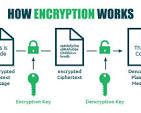The Importance of Email Encryption in Ensuring Data Security
Email encryption is a vital tool in safeguarding sensitive information exchanged through email communication. In today’s digital age, where cyber threats are rampant and data breaches are a common occurrence, ensuring the security and privacy of email correspondence has become more critical than ever.
Encryption involves encoding the content of an email message so that only the intended recipient with the decryption key can access and read it. This process effectively protects the data from being intercepted or viewed by unauthorized parties, thereby maintaining confidentiality and integrity.
By encrypting emails, individuals and organisations can prevent hackers, cybercriminals, and even service providers from accessing sensitive information such as personal details, financial data, intellectual property, and confidential business communications. This level of protection is essential for maintaining trust with clients, partners, and stakeholders.
Furthermore, email encryption plays a crucial role in compliance with data protection regulations such as GDPR (General Data Protection Regulation) and HIPAA (Health Insurance Portability and Accountability Act). These regulations mandate the secure handling of personal and sensitive data to prevent unauthorised access or disclosure.
Implementing email encryption solutions can be relatively straightforward with the use of secure email services or encryption software. These tools utilise advanced cryptographic algorithms to scramble the content of emails before transmission and decrypt them upon receipt, ensuring end-to-end security throughout the communication process.
In conclusion, email encryption is an indispensable measure for protecting sensitive information and upholding data security standards. By incorporating encryption into your email practices, you can mitigate the risks associated with cyber threats and enhance trust in your communications. Stay safe, stay secure – encrypt your emails today.
Understanding Email Encryption: Key Questions Answered
- What is email encryption?
- Why is email encryption important?
- How does email encryption work?
- Is email encryption mandatory for compliance with regulations?
- What are common methods of implementing email encryption?
What is email encryption?
Email encryption is a security measure that involves encoding the content of an email message to protect it from unauthorised access. By using encryption techniques, such as cryptographic algorithms, email encryption ensures that only the intended recipient with the decryption key can read the message. This process safeguards sensitive information exchanged via email from interception by hackers or cybercriminals, enhancing data security and confidentiality in digital communications.
Why is email encryption important?
Email encryption is crucial for safeguarding sensitive information transmitted via email. In today’s digital landscape, where cyber threats loom large and data breaches are a constant risk, the importance of email encryption cannot be overstated. By encrypting emails, individuals and organisations can ensure that their confidential data remains secure and inaccessible to unauthorised parties. This added layer of protection not only helps maintain the privacy and integrity of communications but also aids in compliance with data protection regulations. Ultimately, email encryption serves as a vital tool in fortifying the security of email correspondence and mitigating the potential risks associated with cyber attacks and privacy breaches.
How does email encryption work?
Email encryption works by transforming the content of an email message into a scrambled format using complex algorithms, making it unreadable to anyone without the decryption key. When a sender encrypts an email, the encryption software encodes the message before it is transmitted over the internet. The recipient, who possesses the corresponding decryption key, is then able to decipher the encrypted content and read the message in its original form. This process ensures that sensitive information shared via email remains secure and confidential, protecting it from interception or unauthorized access by cybercriminals or other third parties.
Is email encryption mandatory for compliance with regulations?
Email encryption is often a recommended practice for compliance with regulations governing data protection and privacy, such as GDPR and HIPAA. While these regulations do not explicitly mandate the use of email encryption, they require organisations to implement appropriate security measures to safeguard sensitive information. Email encryption is considered a best practice for ensuring the confidentiality and integrity of data transmitted via email, thereby reducing the risk of unauthorised access or disclosure. By employing email encryption solutions, businesses can demonstrate their commitment to data security and regulatory compliance, ultimately enhancing trust with clients and stakeholders.
What are common methods of implementing email encryption?
There are several common methods for implementing email encryption to ensure the security of sensitive information exchanged through email communication. One widely used approach is asymmetric encryption, which involves using a pair of keys – a public key for encryption and a private key for decryption. Another method is symmetric encryption, where a single key is used for both encryption and decryption. Additionally, secure email services and encryption software offer user-friendly solutions for implementing email encryption, providing end-to-end protection for email content during transmission and storage. By utilising these methods, individuals and organisations can enhance the confidentiality and integrity of their email communications while mitigating the risks associated with cyber threats.

